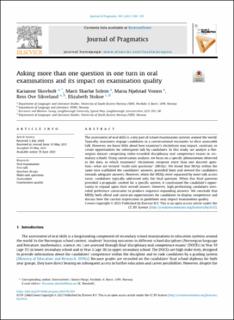| dc.contributor.author | Skovholt, Karianne | |
| dc.contributor.author | Solem, Marit Skarbø | |
| dc.contributor.author | Vonen, Maria Njølstad | |
| dc.contributor.author | Sikveland, Rein Ove | |
| dc.contributor.author | Stokoe, Elizabeth | |
| dc.date.accessioned | 2022-10-19T07:41:10Z | |
| dc.date.available | 2022-10-19T07:41:10Z | |
| dc.date.created | 2021-06-16T14:04:08Z | |
| dc.date.issued | 2021 | |
| dc.identifier.citation | Journal of Pragmatics. 2021, 181 (August), 100-119. | en_US |
| dc.identifier.issn | 0378-2166 | |
| dc.identifier.uri | https://hdl.handle.net/11250/3026911 | |
| dc.description.abstract | The assessment of oral skills is a key part of school examination systems around the world. Typically, examiners engage candidates in a conversational encounter to elicit assessable talk. However, we know little about how examiner's elicitations may impact, constrain, or create opportunities for subsequent talk by candidates. In this study, we analyse a Norwegian dataset comprising video-recorded disciplinary oral competence exams in secondary schools. Using conversation analysis, we focus on a specific phenomenon observed in the data, in which examiners' elicitations comprise more than one discrete question—what are termed “multi-unit questions” (MUQs). We found that MUQs within the same turn scaffolded the candidates' answers, provided hints and steered the candidates towards adequate answers. However, when the MUQs were separated by more talk across turns, candidates typically addressed only the final question. When this final question provided a pragmatic context for a specific answer, it constrained the candidate's opportunity to expand upon their overall answer. However, high-performing candidates overruled preference constraints to produce sequence-expanding answers. We conclude that MUQs both afford and constrain opportunities for candidates to display competence and discuss how the current imprecision in guidelines may impact examination quality. | en_US |
| dc.language.iso | eng | en_US |
| dc.publisher | Elsevier | en_US |
| dc.rights | Navngivelse 4.0 Internasjonal | * |
| dc.rights.uri | http://creativecommons.org/licenses/by/4.0/deed.no | * |
| dc.title | Asking more than one question in one turn in oral examinations and its impact on examination quality | en_US |
| dc.type | Peer reviewed | en_US |
| dc.type | Journal article | en_US |
| dc.description.version | publishedVersion | en_US |
| dc.source.pagenumber | 100-119 | en_US |
| dc.source.volume | 181 | en_US |
| dc.source.journal | Journal of Pragmatics | en_US |
| dc.source.issue | August | en_US |
| dc.identifier.doi | 10.1016/j.pragma.2021.05.020 | |
| dc.identifier.cristin | 1916178 | |
| dc.relation.project | Norges forskningsråd: 273417 | en_US |
| cristin.ispublished | true | |
| cristin.fulltext | postprint | |
| cristin.fulltext | original | |
| cristin.qualitycode | 2 | |

